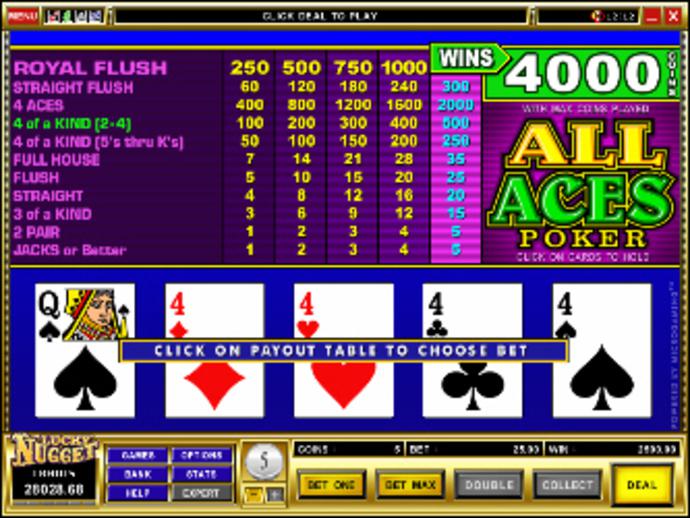It can take a long time to hit that big hand
People call poker/card games in video game form rigged all the time. It basically stems from folks not winning every time they have a pair of 2s. I've spent quite a bit of time in Prominence and feel like it is a really good game. Just because it seems like it has been a very long time since the last royal flush, or you have experienced a long streak with hardly a single high-paying hand does not mean that video poker machines are rigged. In the major gaming jurisdictions, tests are periodically run to ensure that the games results are what the math predicts it will be.
By Jerry 'Stickman' Stich
It seems that hardly a week goes by without someone telling me that they think video poker games are rigged. One standard 'proof' of this statement is the person saying he or she played several months without getting a royal flush. Let's take a look at this premise.
At a very loose approximation, a video poker player should get a royal flush about once every 40,000 hands or so. This number will vary (sometimes by several thousand hands) depending on the game that is being played, the specific pay table of the game being played, and/or how closely the player follows the proper playing strategy for the game they are playing.
When you think about it, 40,000 hands is a very large number. I would guess the average recreational player plays somewhere around 200 to 400 hands an hour on average. A recreational player likes to play, but is also interested in talking to those around them, or the bartender. They may even spend time on their cell phone or engaged in people watching or other non-playing activities while seated at a game. If the game is not going well and they are losing fairly quickly, they may really slow down their play or even stop for a period of time even though they continue to sit at the machine. Counting all the interruptions and distractions for the recreational player, let's assume they play 300 hands per hour – and this may be generous. That 300 hands per hour works out to five hands a minute or one hand every 12 seconds. At this rate, the player will have to average almost 135 hours of play before a royal flush becomes 'due.'
Actually, for the record, a royal flush is never really due. Each hand has the same chance of a royal flush–approximately one in 40,000 hands. But for this part of the discussion, let's assume a royal flush will occur after 40,000 hands which for this player is 135 hours. If this player averages four hours of play per day, it will take better than 33 days of play in order to get a royal flush. If there is such a thing as an average recreational player, they will probably play no more than about once or twice a month at a local casino. If each monthly trip involves four hours of video poker play, it will take almost three years before 40,000 hands are played. At two four-hour trips per month it will take almost a year and a half to reach 40,000 hands. That is a whole lot of time.
Adding to the uncertainty of the number of hands played, most people assume they play a lot more hands than they actually do. Most players do not have a clue how many hands they actually play. When they say that it has been 'forever' since their last royal flush, they really don't know if they have played 5,000 hands, 10,000 hands, 20,000 hands, 40,000 hands, or 100,000 hands – although I would seriously bet against that last number.
The human brain is an amazing organ. It can truly alter reality. Think about taking a road trip. The journey to your destination seems to take a whole lot longer than the return trip.
Why is that?
It is because you are anxious to get to your destination. Players tend to quickly forget the last royal flush. They are much more concerned about getting to their 'destination' – the next royal flush. As they feed one bill after another into the machine, all they know is they need something big – like a royal flush – and they are anxious to get it.
My standard answer to players saying it has been forever since their last royal flush (after determining they have no idea how many hands they have played since that time) is basically what I have written above. Unless they actually know how many hands they played, it will always seem like a lot more hands than reality.
If they do have a decent idea of the number of hands, then a discussion about randomness and standard deviation follows. Even though a royal flush should occur about once every 40,000 hands, it can take up to three times (or more) that many hands before one actually appears. The 40,000 number is an average over a very long timeframe. Anything can happen in short term.
Is Video Poker Rigged
The same arguments hold for players who say they have not received other low frequency hands such as a straight flush, a four of a kind, or a flush. Most players do not know how many hands they have played and they most likely overstate the actual play. Even if they do have a decent idea of the number of hands played, standard deviation is a brutal thing. You can play for several hours getting basically nothing but trash. This is what is remembered. You remember because you have to keep feeding the machine. The times you forget are those where the less frequent hands just keep coming and coming. Those are the good times and the minutes and hours go by quickly. In the long run it all balances out, but you only remember the bad times.
Is Video Poker Rigged
Just because it seems like it has been a very long time since the last royal flush, or you have experienced a long streak with hardly a single high-paying hand does not mean that video poker machines are rigged. In the major gaming jurisdictions, tests are periodically run to ensure that the games results are what the math predicts it will be. Also, the casinos have almost every machine 'rigged' in its favor. Even with all hands occurring exactly as the math dictates (in other words a fair game) the casino will get a profit. They short pay the winning hands. That is where their profit is, not by reducing the appearance of hands to less than random.
They have no need to rig games to not be fair. They will get their money. They always do.
Many of us have been excited about playing slots at some point, only to find the excitement quickly turning into disappointment. Nothing seems to work. Only small wins and not even a single bonus game. You feel cheated.
Was the slot machine rigged?
In all honesty, it could have been. If you played at one of the reputable real-money online casinos, however, it probably wasn't. You just happened to be on the bad side of variance (in the long run, you should lose a lot of money at slot machines anyway).
And we'll never truly know. Since you're supposed to lose at slot machines and online casinos have no obligations to share their payback percentages, they could run their machines at ridiculously low returns and we wouldn't have the slightest clue about it.
Many people will tell you that rigged online slots are rare because online casinos have no reason to cheat; they make so much money from slot machines already simply by offering fair games.
That's far from a convicing argument - as if there were no greedy people in the world. But there's some logic behind the argument as well. Since the casino already has an edge over the player, the only thing they need is to get more players. Cheating slot machine players out of their money is hardly a good way to get new sign-ups.
In a sense it's hard to define 'rigged online slots' since technically an online casino doesn't cheat if it has ridiculously low payout percentages set to its slot machines.
But we should treat them the same as if they were cheating.
How to Find Safe Online Casinos

The solution I've come-up with is to play at reputable sites that have reputable private auditors testing their RNGs and payout percentages. Even better if the private auditor has been allowed to publish how much the online casino has paid out monthly.
Still, one could argue that you never know if online casinos bribe private auditors to creating good reports. True. We'll never know for sure.
But if you believe that there are online casinos without rigged slots, why not trust the ones that are willing to let auditors publish their results for everyone to see? The ones that seemingly have nothing to be ashamed of?

The solution I've come-up with is to play at reputable sites that have reputable private auditors testing their RNGs and payout percentages. Even better if the private auditor has been allowed to publish how much the online casino has paid out monthly.
Still, one could argue that you never know if online casinos bribe private auditors to creating good reports. True. We'll never know for sure.
But if you believe that there are online casinos without rigged slots, why not trust the ones that are willing to let auditors publish their results for everyone to see? The ones that seemingly have nothing to be ashamed of?
If I were to run an honest online casino with no rigged slot machines, why wouldn't I publish payout reports? Why would I let anyone think that I could have rigged online slots at my casino?
By the way, one of the ways to keep an eye on dishonest, cheating online casinos is to look at internet blacklists, such as the one at Casinomeister.com.

